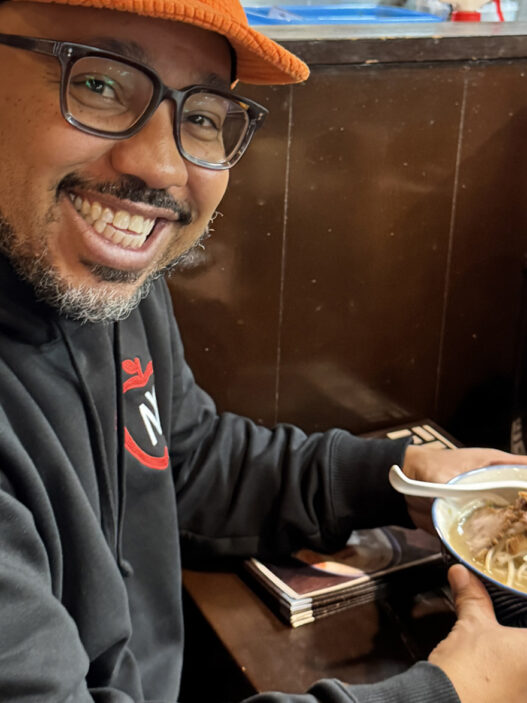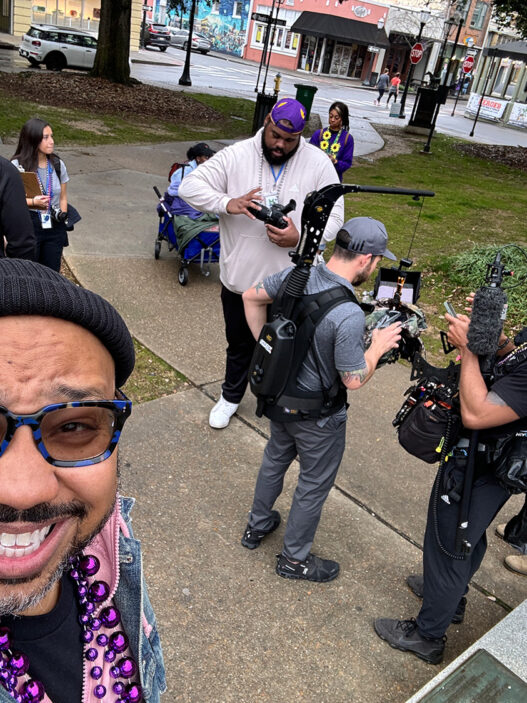Born in Brooklyn, New York on November 3, 1955, and raised in Queens, Keith Eric Harris lived a life defined by transformation, resilience, and an unwavering commitment to personal growth. His journey from a restless young man to a distinguished career at CBS, family man, and wise elder is a compelling study in the evolution of character and the enduring impact of faith and family.
Listen To The Keith Harris Legacy Call:
Early Life and Family Foundations
Keith was one of four children born to Reverend Arthur W. Harris and Mary Pike Harris. After his mother’s early passing, he was raised by his father and stepmother, Reverend Frances Harris in South Jamaica, Queens. Growing up in a preacher’s home meant strict discipline, regular church attendance, and high expectations.
“My father was the kind of man—and you gotta remember, these was World War Two veterans—the way they cared about their family is they go to work, they come home, they got the big piece of chicken because they took care of the bills,” Keith recalled. “I remember at 12 years old, because I used to kiss my father goodnight, at 12 years old he said, ‘All right, that’s it. You don’t kiss me goodnight no more.’ So there wasn’t a whole lot of affection there.”
Despite the strictness, Keith’s parents instilled vital principles that would guide him throughout his life. From his father came the unshakable belief that “your word is your bond.” His mother taught him shrewd financial wisdom: “Poor people get on the phone and brag about how much they paid for something, and rich people get on the phone and brag about how little they paid for something.”
These lessons didn’t always take root immediately, but they would become anchors in his adult life.
Education and Early Leadership
Keith attended the top-ranked Louis Pasteur Junior High School 67 and later Jamaica High School. At Jamaica High, his leadership qualities quickly emerged when he founded the school’s first Black Student Organization and was unanimously elected chairman.
This early activism came at a cost. “I got kicked out of there. Something about inciting a riot and writing a poem about the principal that they copied and put all over the school,” Keith explained. At the time, Jamaica High was approximately 80% white, admitting some Black students under a program called College Discovery Development. Keith and others protested against what they saw as prejudice from a guidance counselor, and Keith “took the fall.”
Keith was also a talented athlete, excelling on the varsity wrestling team and helping lead the Beavers to several winning seasons. His athletic prowess was so impressive it attracted attention from college recruiters, including Michigan State’s Division I program.
Military Service and Early Adulthood
Seeking independence and ironically “tired of being told what to do” in his father’s strict household, Keith enlisted in the United States Army in January 1972. The irony wasn’t lost on him: “I decided I was going to join the Army because I was tired of people telling me what to do. That caught me off guard, because I got in the Army, Amon, that’s all they was telling me. They were telling me what time to go to bed, what time to get up, what time to eat and everything.”
His military service was brief but formative. Keith was honorably discharged under honorable conditions in January 1973, after serving as an armistice unit supply specialist at Fort Dix.
The Winding Path to a Career
Following his military service, Keith navigated a series of jobs, including working security at a department store on Rockaway Boulevard and Alexander’s in the South Bronx. “The only guards that they would hire, you either had to be in the military or have a martial arts belt,” he recalled of the Alexander’s position. “They had towers built like prison towers… If you was assigned to the tower, you’d go up in the tower with binoculars and you’d just search the store, looking over the store.”
Keith’s path eventually led him to the television industry. His first media job was at EUE/Screen Gems Ltd in New York, where he discovered his passion for broadcasting. He continued developing his skills at Video Dub and Moxie Video, working with production trucks sent to various sporting events.
The Turning Point
By his own admission, Keith’s early adulthood included excess and poor choices. “A spiral in life, you know, a life that was out of control, a life that had cost me a wife and the company of my children and cost me a couple of jobs,” he reflected. “It comes to a point where you just—it’s not fun anymore. You got people moving along in their jobs and getting married and buying houses and living life like grown-ups, and I’m still wondering when I’m gonna grow up.”
In 1991, at the age of 35, Keith made a decision that would alter the trajectory of his life: he quit drinking and smoking cold turkey. This commitment to sobriety marked the beginning of a profound personal transformation.
“That’s something that developed when I gave up smoking and drinking almost 30-some years ago. That’s when it started to develop,” Keith said of his attitude of gratitude, which became a guiding principle in his life.
CBS and Career Achievement
Keith’s brother provided a crucial opportunity when he helped secure him a position at CBS. Though Keith had previously squandered a first chance at CBS by showing up unprepared, his brother gave him another opportunity after Keith had been sober for about a year and a half.
What followed was a three-decade career in broadcast television, culminating in his role as Technical Director. “I love doing live TV. I love the pressure of it,” Keith said.
During his time at CBS, Keith was part of milestone events in American television history, including the first HD Super Bowl, the first HD March Madness broadcast, and multiple Masters tournaments and Grammy Awards. He also worked on the technical side of the 60 Minutes show.
Keith witnessed and adapted to the rapid evolution of broadcasting technology—from the days of heavy two-inch video tape (where a 60-minute show reel weighed 18 pounds) through one-inch tape, Beta, and finally to digital encoding. This transformation made the technical aspects of broadcasting significantly easier over the years, though Keith maintained his appreciation for the pressure and precision of live television.
Fatherhood and Family
Keith was a loving father to his children: Amir Harris, Rahiem Harris, Abraham “AB” Aragones, and Terrel Hunt. He took immense pride in his grandchildren: Ayana, Aaliyan, Ayden, Joshua, Nia, and Sariah.
Determined not to repeat the emotional distance of his own upbringing, Keith approached fatherhood differently than his father had. “With my sons, I wanted it different,” Keith explained. He prioritized emotional presence and open communication, understanding that “if you want them to listen, you have to be there.”
Keith spoke with pride about his first child: “I had picked out his name before he was even born. I told my mother his name was going to be Amir, and Amir means Prince, and my mother in all her wisdom told me, ‘You know that don’t make you no king, right?'”
He recognized and celebrated the unique qualities in each of his children. “It’s amazing, because they’re all different,” he reflected. “Rahiem is more street than I ever was. Amir is more like me, more of a thinker. AB is a little combination of both – he’s a little diplomat and a little street and just a good kid.”
Keith also played an important role in the life of his stepson Terrel, who lost both his birth parents. Terrel went on to play quarterback for Syracuse University, and Keith admired his determination while also worrying about the pressure Terrel put on himself to succeed.
Navigating America While Black
Like many Black men of his generation, Keith learned early how to navigate America’s complex racial landscape. “There was a time I was getting pulled over a lot,” he recalled. “Partly because I’d be wearing my Yankee baseball cap and driving my BMW 650, and they would think I was younger.”
His approach during these encounters was strategic: “I’m respectful, but I’m not subservient. I let them know: ‘What is the problem? This is what you want. You got it. I don’t engage in no conversation. Don’t try to be friendly with me. Give me my ticket, let me be on my way.'”
These lessons were passed down to his children and grandchildren as essential survival tools. “You keep your hands on the wheel, you don’t make sudden moves, you ask to call your parents,” he instructed them. “It’s not paranoia. It’s preparation. And it can mean the difference between life and death.”
Keith possessed a profound understanding of America’s racial dynamics. When discussing the January 6, 2021 Capitol riot, he observed: “They’re scared. For hundreds of years, you’ve lived in a country where, if you was white, you was afforded certain privileges… All of a sudden, you turn around, there’s immigrants coming in… and then something you never thought would happen, you had a black president… If I was a white person and I thought Black people was gonna be in charge, I’d be scared that they’re gonna do to me what I did to them.”
Music, Culture, and the Spirit of the 70s
Coming of age in 1970s New York City, Keith was immersed in one of the most vibrant cultural moments in American history. “The 70s was the joint, man. Oh man. Some of the best music you ever want to hear came out of the 70s,” Keith reminisced.
His musical influences were diverse and soulful: “Earth, Wind and Fire… Sly and the Family Stone… Marvin Gaye… Barry White, baby-making music… Parliament Funkadelic.”
House parties in basements with red light bulbs and slow jams created the backdrop for youthful adventures. “All you had was music. Somebody might have stuck in a beer or two. And a red light bulb—had to have your red light bulb so nobody could hardly see nothing. And they’d start playing those slow jams.”
Retirement and Legacy Building
After three decades at CBS, Keith retired in 2020 when the pandemic led to staffing reductions. Though initially nervous about the transition, he found himself well-positioned to embrace retirement, focusing on investments, real estate, and building generational wealth.
“Passive income is key,” he emphasized. “That means you’re making money when you’re sleeping. You need more than one stream of income in order to be comfortable.” Together with his brother and sons, he founded Harris Group 2020, flipping properties in Detroit with an eye toward creating a lasting legacy for his family.
Though he faced health challenges in his later years, including requiring dialysis three times a week, Keith refused to let circumstances define him. He and his fiancée, Maria Serrano, still enjoyed life together, including trips to New Orleans when his treatment schedule permitted.
Faith, Resilience, and Wisdom
Keith’s core philosophy was simple but profound: “Believe in yourself. If nobody else believes in you, you believe in you.” For Keith, this self-belief was grounded in faith. “For me, it’s a basis in faith… my faith in God… that he has a purpose for you. Every human being comes here with a purpose. Whether you fulfill that purpose or not is based on the decisions that you make.”
Gratitude became a central pillar in Keith’s life, especially after achieving sobriety. “I come to the realization that gratitude is my greatest asset,” he reflected. “No matter how bad a day is, it could be worse. I got my life, reasonable health, roof over my head, eating anything I want. Gratitude is very big in my life. There’s always something to be thankful for.”
Keith also possessed a remarkable capacity for empathy, which he considered “probably my greatest attribute.” This empathy allowed him to understand people across different backgrounds and perspectives, expanding his horizons and deepening his connections.
When asked what he wanted to be remembered for, Keith replied: “I think it changes, but that I’m willing to give—just a guy that was willing to give, you know, and always had a smile.”
The Value of Human Connection
In his later years, Keith lamented the decline of genuine human interaction in modern society. “People don’t talk to each other anymore. It’s the easiest talent that we have is to talk, but we won’t talk to each other. Today, we’d rather text each other… We walk around with headphones on. We don’t even see the people around us. And I think that’s going to contribute to a society that’s lacking in empathy.”
For Keith, relationships were built on giving without expectation. “If you want to be loved, you got to give love. And not be afraid to give love. People are afraid to give love today, afraid of rejection, afraid they’re not going to get it back. It’s okay if you don’t get it back. It’ll come through somewhere.”
Remembering Keith Harris
Keith Eric Harris passed away peacefully on October 5, 2022, at the age of 66. He now rests with his father, Reverend Arthur W. Harris; mother, Mary Pike Harris; stepmother, Frances Harris; brother, Mark Harris; adopted sister, Pamela Harris; and his loves Aida Ramos and Katrina Hunt.
Many remember Keith for his contagious laugh, love of family, dedication to weight training, and passion for sports—especially his beloved New York Jets. He was a man of warmth, humor, sincerity, and a true gentleman who loved life.
His legacy lives on through his siblings, Arthur W. Harris, Jr. (and wife Rosa) and Constance Harris; his children, Amir Harris, Rahiem Harris, Abraham “AB” Aragones, and Terrel Hunt; his grandchildren, Ayana, Aaliyan, Ayden, Joshua, Nia, and Sariah; his niece Sanaa Harris; and his nephews, Jamal Harris (and wife Michelle) and Aaron Harris (and wife Audrey).
Keith’s story is not just his own. It belongs to the lineage he built, the people he guided, and the generations that will carry his name forward. A name not just spoken, but lived—with grit, with grace, and above all, with gratitude.
~~~

Want to capture your own story? A Legacy Call is a one-hour recorded conversation that preserves your memories, wisdom, and life experiences. Click here to learn more or email social@amonfocus.com for custom requests and details.

















